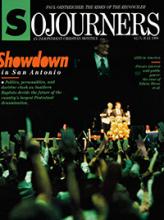"We keep on winning!" The crowd thundered its approval and Jesse smiled. It was May 3, primary election night in the District of Columbia, and Jesse Jackson had just won 80 percent of the vote. The winning candidate arrived at the victory party about 11 p.m., and the people were ready to hear him speak.
Read the Full Article

Already a subscriber? Login
